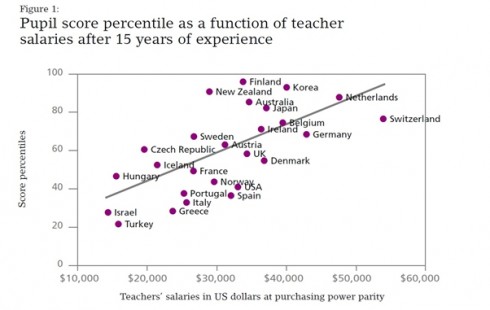Teachers are, I believe, human too. So it should not be surprising that more motivated teachers perform better. Oscar Marcenaro-Gutierrez and Peter Dolton highlight an OECD report that shows the benefits of increasing teacher pay.

What’s most interesting though is their explanation of the data. It’s not necessarily that if you pay an individual teacher more they work that much harder, but that if you pay more you increase the status of the profession and so you attract more potential teachers and are able to select better teachers:
… improving teachers’ pay improves their standing in a country’s income distribution and hence the national status of teaching as a profession. As a result of this higher status, more young people will want to become teachers. This in turn makes teaching a more selective profession and hence facilitates the recruitment of more able individuals.
Higher status and higher pay are invariably linked but the two can provide separate driving forces to engineer better recruits to the profession. The key hypothesis is that better pay for teachers will attract higher quality graduates into the profession and that this will improve pupil performance.
— Dalton and Marcenaro-Gutierrez (2011): If you pay peanuts, do you get monkeys? in CenterPiece Magazine
(via The Dish).
So the actual pay is secondary to the status conferred by the job. I would further speculate that teachers motivated more by status rather than pay are more likely to want to excel at their work, since the quality of their work is tied more on their self-worth.